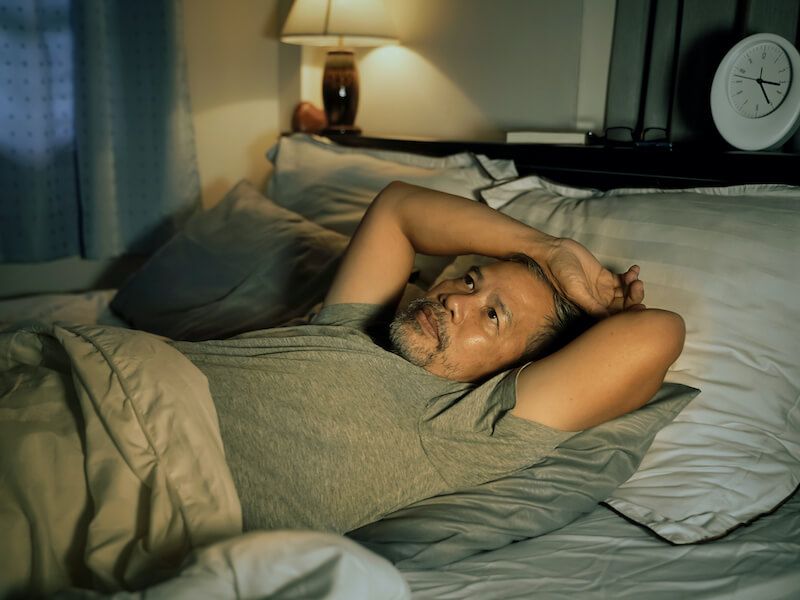Does Insomnia Impact Hearing Loss?

It’s not fun when you can’t sleep at night. And when it happens frequnetly, it’s particularly vexing. You toss and turn and maybe stare at the clock (or your phone) and stress about just how tired you’ll be the next day. When these types of sleepless nights persistently happen, medical professionals tend to use the term “insomnia”. With insomnia, the downsides of not sleeping will then begin to compound and can, after a while, have a negative affect on your overall health.
And the health of your hearing, not unexpectedly, is part of your general health. That’s correct, insomnia can have an affect on your ability to hear. Though the relationship between hearing loss and insomnia might not be a cause-and-effect scenario, there’s still a link there.
Can your hearing be affected by lack of sleep?
What could the connection between hearing loss and sleep be? According to considerable research, your cardiovascular system can be affected by insomnia over a long time period. It becomes harder for your blood to flow into all of the extremities of your body when you aren’t getting the renewing power of a good night’s sleep.
Insomnia also means an increase in stress and anxiety. Feeling stressed and anxious will impact you in physiological ways as well as mentally.
So how is that connected to hearing loss? Your ears work because they’re filled with fragile little hairs known as stereocilia. When waves of sound vibrate these little hairs, signals are sent to your brain which translates these signals into sound.
When your circulatory system isn’t working correctly, these hairs have a difficult time thriving. In some circumstances, poor circulation can damage these hairs, permanently. And once that takes place, your hearing will be permanently damaged. This can result in permanent hearing loss, especially the longer it continues.
Is the reverse true?
Is it possible for hearing loss to make you lose sleep? Yes, it can! Hearing loss can make the world very quiet, and some individuals like a little bit of noise when they sleep. For people in this group, that amount of quiet can make it very hard to get a good night’s sleep. Any kind of hearing loss anxiety (for example, if you’re worried about losing your hearing) can have a similar impact.
If you have hearing loss, what can you do to get a quality night’s sleep? Stress on your brain can be decreased by wearing your hearing aids every day because you won’t be wearing them while you sleep. Following other sleep-health tips can also be helpful.
How to get a quality night’s sleep
- Don’t drink caffeine after lunch. : Even if you drink decaf, it still has enough caffeine to give you difficulty sleeping. This includes soda also.
- Try not to use your bedroom for other activities other than sleeping : Try to limit the amount of things you use your bedroom for. Working in your bedroom isn’t a very good idea.
- Steer clear of screens for at least an hour before going to bed : (Actually, the longer the better.) Screens tend to activate your brain
- For at least a couple of hours before you go to bed, try to avoid liquids : Needing to get up and go to the bathroom can initiate the “wake up” process in your brain. It’s better to sleep right through the night.
- Exercise regularly : You could go to bed with some extra energy if you don’t get enough exercise. Getting enough exercise every day will really be helpful.
- Before bed, refrain from drinking alcohol : Your existing sleep cycle will be disturbed by drinking alcohol before bed.
- Find ways to reduce stress : Get away from work and do something soothing before bed.
Be aware of the health of your hearing
Even if you have experienced some insomnia-associated symptoms in the past, and have some hearing loss, your symptoms can still be controlled.
If you’re concerned about your hearing, make an appointment with us today.
Call Today to Set Up an Appointment
Start Your Journey To Better Hearing Today
Kankakee, IL
1455 W. Court St.
Kankakee, IL 60901
815 939 2024
Mon & Wed: 9am-4:30pm (Staff only)
Tue & Thu: 8:30am-5pm (Doctor sees patients)
Fri: 9am-1pm (Staff only)
Fri: 2pm-5pm (Doctor sees patients)
Closed for lunch 12pm-1pm
Steger, IL
29 West 34th St.
Steger, IL 60475
708 756 1767
Mon & Wed: 8:30am-5pm (Doctor sees patients)
Tue & Thu: 9am-4:30pm (Staff only)
Fri: 8:30am-12pm (Doctor sees patients)
Fri: 1pm-4:30pm (Staff only)
Closed for lunch 12pm-1pm


